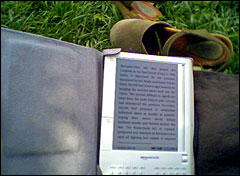Dear Umbra,
I have noticed that digital book readers have started to enter the market and wonder if they are more ecologically sound than conventional books. I am interested in buying one but suspect that they are full of metals that damage the environment in their production. Also, they would use up energy when in use, but I have heard that this is minimal. On the other hand, paper books take a lot of production and transport to reach the reader. Which would be the more eco option?
Jonathan A.
Glasgow, Scotland
Dearest Jonathan,
It hurts to say it, but e-books are looking like a good option, even perhaps the better option. Ouch. Usually for these which-is-better questions we have to gather a few tidbits of Life Cycle Analysis, paste them together with our assumptions, and call it good. But Life Cycle Analysts are excited about e-books and e-newspapers, for some reason, and there is a shocking amount of data analysis out there. Enough to make my head feel all fuzzy inside. There are caveats as usual, but I am forced to report the general conclusion that e-books produce less CO2 emissions and use less water than conventional newspapers and books.
(Parenthetically: One disturbing general trend is the proliferation of e-terms, and the now accepted naming convention of simply adding an “e” in front of any word to indicate an electronically based version. Can’t we work a little harder to make a stand-alone word? E-ing itself seems innocent enough, but consider that the plain word “mail” now requires clarification — “snail mail” [ha ha!] or “regular old mail.” I register my discontent. End e-parens.)
It is, of course, impossible to include everything in a Life Cycle Analysis. Interestingly, none of the e-book LCAs and LCA summaries I found seemed to be able to include what you and I might call the full impact of resource extraction. The horrors wrought in Congo on behalf of e-things are fresh in my mind from a recent New York Times article. But these sorts of larger enviro-social costs are not easily quantified, and perhaps not fully known. So in answer to the main part of your question about heavy metals, this issue is not fully addressed in the LCAs I saw, but is certainly a concern.
Our other issues — paper production, energy use, and transportation — are dealt with more thoroughly. Let me just sum up a few of the LCA results, which deal with both books and newspapers, and we’ll link to the studies for your further analysis. A MS candidate named Greg Kozak pitted textbooks against e-book devices [PDF] in 2003. He found that paper production, electricity of printing operations, and personal transportation were the main factors affecting the book footprint, while electricity was the main issue for e-readers; and that books were responsible for four times the greenhouse emissions as e-readers. In ’04, two UC-Berkeley students evaluated newspaper vs PDA-based e-newspapers [PDF], and decided that a newspaper released 32-140 times the amount of CO2, and used 26-185 times the amount of water. A 2007 study in Sweden (here is the abstract) also looked at newspaper and found that newspaper’s biggest impact was in the paper production, while energy was the big impact for reading on the internet; for e-devices (the Kindle, etc.), production of the e-object is the biggest impact. The study concluded that reading e-newspapers had less impact than an actual newspaper.
Of course, all these studies make certain assumptions, and the results change depending on the source of electricity, the number of times a newspaper is read, how long the e-reader is used, and so on. There is also, of course, the unquantifiable joy of holding and touching real paper — and some publishers have begun to use recycled or FSC-certified paper, which helps to that end. There does, however, appear to be a pro-e-reader trend.
So go ahead and get your e-reader if you want one. But don’t forget about the three Rs. Use it for a long time, and recycle it when you are done.
E-ly,
Umbra


